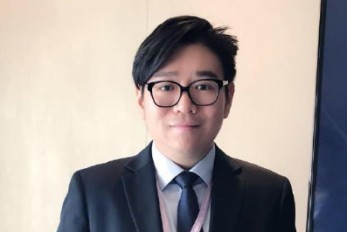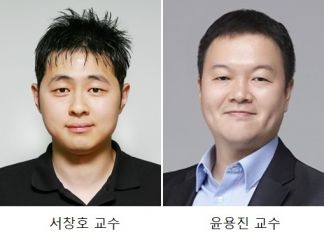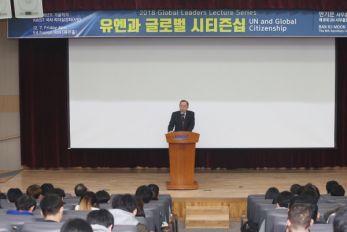Kaist
Korean

Education News
College of Engineering News
-

Promoting metaverse initiatives with an active age..
Hong Kong-based professionals were provided a metaverse course by Professor Lik-Hang Lee in collaboration with the Hong Kong Productivity Council(HKPC) during the Spring 2022 semester. Inresponse to the growing need for virtual worlds and virtual-physical hybrid settings, "The Metaverse Course for Professionals" intends to cultivate world-class metaverse talent. The traing covered the parallel virtual world and how to exploit digitalization and industry in the metaverse era. The training was attended by R&D scientists, consultants, software engineers, and associated professionals from the HKPC. The students completed extensive courses on topics such as creating and executing virtual-physical blended environments, metaverse technologies and ecosystems, immersive smart cities, token economies, and intelligent industrialization in the metaverse age. < Figure 1. Media Coverage by HKPC regarding the KAIST's Metaverse course > Moreover, Professor Lee and his collaborators worldwide have conducted research stucies on building user0centric urban areas featuring virtual-physical blended experiences, also known as metaverse cities. His recent studies aim to strike a balance between user interactivity bandwidth and user mobilit in the metaverse cities. Some AR/VR-based gadgets and system solutions include EMG-based text entry with occupied hands [Ref.4] (Figure 2A), freehand interaction of content editing on mobile immersive experience [Ref.3] (Figure 2C), VR-driven design of human-drone interfaces [Ref.5] (Figure 2D), user authentication on mobile geadsets with gaze and footsteps [Ref.2] (Figure 2E), multi-modal metaverse between Earth and Mars [Ref.6], and to name but a few. When the metaverse services appear ubiquitously in our cities, the studies mentioned above enable users to convert their intentions into actions seamlessly in such immersive environments. < Figure 2. Smapshots of recent research on Augmented Reality(AR) and Virtual Reality(VR) >
-

KAIST and Google Jointly Develop AI Curricula
KAIST selected the two professors who will develop AI curriculum under the auspices of the KAIST-Google Partnership for AI Education and Research. The Graduate School of AI announced the two authors among the 20 applicants who will develop the curriculum next year. They will be provided 7,500 USD per subject. Professor Changho Suh from the School of Electrical Engineering and Professor Yong-Jin Yoon from the Department of Mechanical Engineering will use Google technology such as TensorFlow, Google Cloud, and Android to create the curriculum. Professor Suh’s “TensorFlow for Information Theory and Convex Optimization “will be used for curriculum in the graduate courses and Professor Yoon’s “AI Convergence Project Based Learning (PBL)” will be used for online courses. Professor Yoon’s course will explore and define problems by utilizing AI and experiencing the process of developing products that use AI through design thinking, which involves product design, production, and verification. Professor Suh’s course will discus“information theory and convergence,” which uses basic sciences and engineering as well as AI, machine learning, and deep learning.
-

Do Not Erect a Wall, Build a Bridge
(Mr. Ban gave a lecture on UN and Global Citizenship at KAIST) “People are saying that multilateralism is under threat, but I believe that it has helped others keep away from wars. There are currently invisible walls among countries. But do not erect the wall, build the bridge!” On December 7, KAIST invited one of the most admired people by Korea’s younger generation to give a lecture on UN and Global Citizenship, as the final session of the Global Leaders Lecture Series 2018. He is the 33th Minister of Foreign Affairs and the 8th Secretary-General of the United Nations, Ban Ki-Moon. Mr. Ban is recognized for making significant contributions to world peace and environmental preservation during his term at the UN. Mr. Ban first opened his lecture by explaining his great expectations for KAIST students. “KAIST is one of the outstanding universities that fosters the world’s best scientists and for that I have a great expectations for your role in the era of the Fourth Industrial Revolution. In this rapidly changing society, acquiring global citizenship is most important,” he said. Who are global citizens? According to UNESCO, they are ‘active promoters of more peaceful, tolerant, inclusive, secure and sustainable societies’. He stated that global leaders lacking global citizenship has resulted in so many disputes among countries and concerns for themselves. This concept of global citizenship came to him when he studied abroad in the U.S as a young man and met John F. Kennedy. He said, “It touched my heart although I was young. He (John F. Kennedy) told me that the world leaders were not getting along well. During the hype of the Cold War, national boundaries were meaningless. The question was whether I could help others. He then encouraged me, telling me that I could change it because I was young.” Mr. Ban proposed four required mindsets for global citizenship. The first is to have respect, empathy, and trustworthiness for others. He believes that speaking is the foundation of knowledge, while listening is the foundation of wisdom. Although the concept of philosophy might vary between the East and West, listening to others is very important for gaining respect, empathy, and trustworthiness. The second is to be future-oriented, particularly for scientists who have the potential to change civilization. He encouraged the audience to look to the future by sharing his story about climate change. “During my term, I received strong advice from scientists that led me to prioritize the issue of climate change. I focused on climate change for better living conditions around the world.” He also added, “This cannot be done by one country. We need to all work together to live harmoniously with nature.” Third, having a critical mindset is important, especially for scientists because it helps with solving problems by taking a scientific approach, without missing any of the small things. It is essential for scientists to find out new things, particularly in the era of the Fourth Industrial Revolution and informatization; however, they need to keep in mind how their findings will affect us. For instance, they need to question how robotics will change humans’ living patterns, as well as their role and how it links to humanity. Last but not least, passion, which goes along with compassion, is required for helping others. Ban thinks people without passion are like the walking dead. When pursuing policies, they need to have the passion to drive it. At the same time, they need to have compassion for creating a happier life for everyone. Mr. Ban ended by saying to the students, “You did not lead the era of informatization, but you are the beneficiaries of it. Acquiring global citizenship, you need to think how you can help even out the growth across the globe through the development of science during this era.”
-
KAIST Seals the Deal for Kenya KAIST Project
KAIST will participate in Kenya’s strategic economic development plan under the provision of a turnkey-based science and technology education consultancy for the establishment of the Kenya Advanced Institute of Science and Technology (Kenya KAIST). KAIST signed the contract on November 30 with the Konza Technopolis Development Authority to establish Kenya KAIST. Korea Eximbank will offer a 95 million USD loan to the Kenyan government for this project. The project will include the educational and architectural design and construction of Kenya KAIST. The campus will be constructed in the Konza Techno City nearby Nairobi by 2021, with the first batch of 200 graduate students starting classes in 2022. KAIST, in consortium with Samwoo and Sunjin architecture and engineering companies, will take the lead of the three-year project, with the kick-off ceremony planned at the end of next January in Nairobi. The Kenyan government plans to transform Kenya into a middle-income country under Vision 2030 through promoting science, technology, and innovation for national economic growth. Nicknamed Africa’s Silicon Savannah, Konza Techno City is a strategic science and technology hub to realize this vision. To this end, the medium-term plan set a goal to provide specialized research and training in various leading-edge engineering and advanced science fields. In the two-phase evaluation of the consultancy bidding, KAIST won preferred bidder status in the technical proposal evaluation, outbidding three other Korean consortia. Invited to the financial proposal bidding, the KAIST consortium successfully completed month-long contract negotiations with Kenya last week. KAIST will develop academic curricula for six initial departments (Mechanical Engineering, Electrical/Electronic Engineering, ICT Engineering, Chemical Engineering, Civil Engineering, and Agricultural Biotechnology), which will lay the ground work for engineering research and education in Kenya to meet emerging socioeconomic demands. In addition, KAIST will provide the education of basic sciences of math, physics, chemistry, and biology for students. It is also notable that the Kenyan government asked to develop an industry-academy cooperation program in Konza Techno City. It reflects the growing industrial needs of Kenya KAIST, which will be located in the center of the Konza Technopolis. It is anticipated that the technopolis will create 16,675 jobs in the medium term and over 200,000 after completion, positioning Kenya as an ICT hub within the region. KAIST also shares a similar history of establishment with Kenya KAIST, as it will be built with a foreign loan. KAIST, created by the Korean government in 1971 to drive the economic engine through advancement of science and technology with a six-million USD loan from USAID, has now become a donor institution that hands down science and technology education systems including the construction of campuses to underdeveloped countries. The successful case of KAIST has been benchmarked by many countries for years. For instance, KAIST set up the curriculum of the nuclear engineering program at the Khalifa University of Science and Technology in UAE in 2010. In China, Chongqing University of Technology is running its electrical engineering and computer science programs based on the educational systems and curricula offered by KAIST from 2015. In October, KAIST also signed an MOU with the Prince Mohammad Bin Salman College of Cyber Security, AI, and Advanced Technologies in Saudi Arabia to provide the undergraduate program for robotics. Among all these programs benchmarking KAIST, Kenya KAIST clearly stands out, for it is carrying out a turnkey-based project that encompasses every aspect of institution building ranging from educational curriculum development to campus construction and supervision. President Sung-Chul Shin is extremely excited about finalizing the deal, remarking, “It is of great significance that KAIST’s successful development model has carved out a unique path to becoming a global leading university that will benefit other countries. In only a half century, we have transitioned from a receiver to a donor institution, as the country itself has done.” “KAIST will spare no effort for Kenya KAIST to become a successful science and technology university that will play a crucial role in Kenya’s national development. I believe Kenya KAIST will be an exemplary case of an ODA (Official Development Assistance) project based on the development of science and technology to benefit underdeveloped countries,” he added.

